Tech workers are riding high as unemployment drops again and salaries rise.
Though they remain low, unemployment figures have seesawed over the past six months, a phenomenon that has some tech industry experts scratching their heads trying to make sense of what may be the new norm.
Last month, unemployment in technology fields increased along with the overall US unemployment rate, which rose from 3.5% in July to 3.8% in August, according to new data from the US Bureau of Labor Statistics (BLS). At the same time, total nonfarm employment across all markets increased by 187,000 jobs in August.
The mixed messages in last Friday’s employment report carried over to the tech industry and workforce, according an analysis by industry group CompTIA.
Tech unemployment had dropped from 2.3% in June to 1.8% in July, as tech firms and employers in other industries added workers after a spate of high-profile layoffs in the tech industry.
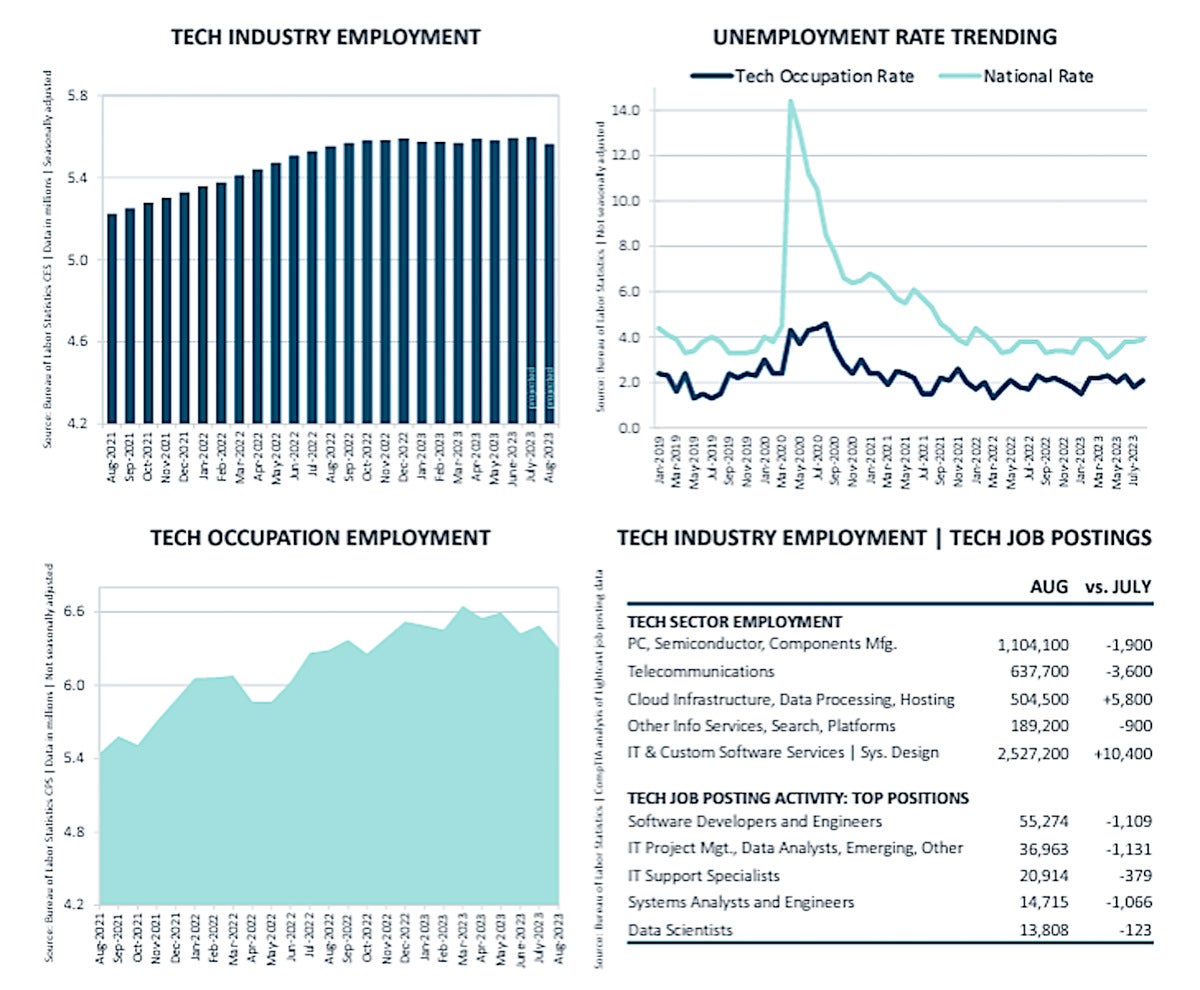
The latest BLS report, however, found that employers across the US economy reduced tech occupations by an estimated 189,000 positions, pushing the unemployment rate for tech jobs up to 2.1% — almost where it was in June, CompTIA said.
“The usual caveats of monthly fluctuations in labor market data apply,” said Tim Herbert, chief research officer at CompTIA. “The seesawing between strong and lagging tech jobs reports is undoubtedly confusing, but the overall macro trend of growth in the depth and breadth of the tech workforce remains steady.”
Employer job postings for future tech hiring (a separate category tracked by CompTIA) totaled nearly 208,000 in August, a slight decline of 1.4% from the previous month. But job postings for information security analysts increased 19% from July to August to more than 12,000 postings. Other in-demand occupations include software developers, tech support specialists, computer systems analysts, and data scientists.
“With ‘pandemic paranoia’ about hiring lingering, companies are continuing to hold onto their workers, remembering how hard it was to rehire,” said Becky Frankiewicz, president of global staffing firm ManpowerGroup’s North America Region. "Essential workers we valued through the pandemic may not be feeling so essential, as real-time job postings for blue collar roles like operations and logistics/maintenance and repair are down 43% month over month" based on ManpowerGroup’s real-time data.

“This Labor Day is a great occasion to celebrate the resilience of the American worker," she said. "Although we are seeing a slowdown, the labor market remains healthy, and we are optimistic about the future."
Positions in emerging technologies or jobs requiring emerging tech skills, such as artificial intelligence (AI) and data science, accounted for 23% of all tech jobs postings in August. Among emerging tech job postings, 37% were associated with AI, with California, Texas, New York, Massachusetts, and Virginia showing the highest numbers of AI-related job postings.

New data from IT staffing firm Experis found that an increasing number of companies surveyed are either adopting or planning to adopt emerging technologies in their recruiting processes. That comes as more than three quarters (78%) of IT organizations report difficulty finding talent with the right skills — a 17-year high.
According to Experis, 58% of employers believe AI and virtual reality will create jobs, not kill them. Additionally, cybersecurity, technical support, and customer experience remain high-priority IT staffing areas. Half of employers say they are training and upskilling their current workforce to address staffing challenges.

"The integration of AI, machine learning, VR/AR, and other emerging technologies is rapidly transforming industries and driving the need for an adaptable workforce," said Experis Senior Vice President Ger Doyle. "We are seeing companies embrace these new technologies with many seeking to hire or upskill existing talent to take advantage of potential productivity gains. Smart employers know that embracing digitization and nurturing human talent will enhance their readiness to succeed in this era of rapid technological advancement."

Table of Contents
- July 2023
- June 2023
- May 2023
- April 2023
- March 2023
- February 2023
- January 2022
- December 2022
- November 2022
- October 2022
July 2023
The unemployment rate for tech jobs dropped from 2.3% to 1.8% in July, as technology companies and employers in other industry sectors added workers, according to analysis of US Bureau of Labor Statistics (BLS) data.
It was the lowest tech-sector unemployment rate since January, according to CompTIA, a nonprofit association for the IT industry and workforce.
The overall US unemployment rate also dropped slightly last month from 3.6% in June to 3.5%, according to BLS data. About 187,000 non-farm jobs were added, less than the average monthly gain of 312,000 over the prior 12 months. In July, jobs grew in healthcare, social assistance, financial activities, and wholesale trade, according to the BLS.
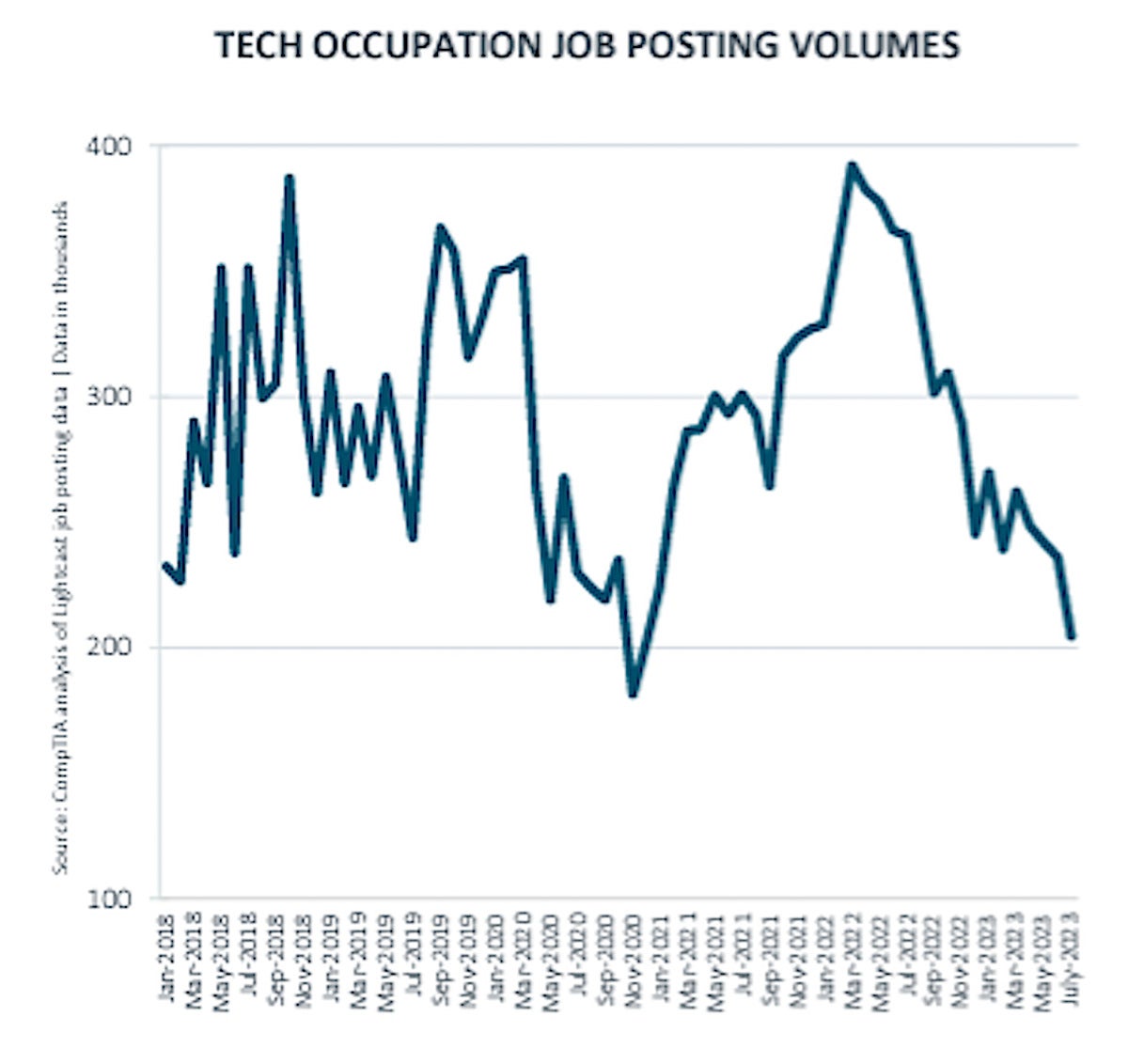
The overall unemployment rate has ranged from 3.4% to 3.7% since March 2022.
According to BLS data, employment in professional, scientific, and technical services continued to trend up in July with 24,000 positions filled.
Tech sector companies increased their staffing by 5,432 employees, according to CompTIA’s analysis of BLS data. Leading the way in new IT hires were custom software services and systems design;and PC, semiconductor and components manufacturing.

IT salaries were on the rise, too, according to a mid-year analysis by business consultancy Janco Associates, as more companies invested in IT. The emphasis in recent years has been on both e-commerce and mobile computing. And with growing numbers of cyberattacks and data breaches, CIOs are looking to harden their sites and lock down data access to protect all of their electronic assets, according to Janco Associates.
The lone drag on the July data was in employer job postings for tech occupations, which slipped to from 236,000 in June to 204,400 for the month of July.
“Given the pace of tech hiring, it remains a fairly tight market for tech talent,” Tim Herbert, chief research officer for CompTIA, said in a statement. “It continues to be an environment where employers must supplement recruiting efforts with proactive talent development strategies.”
While the drop in tech sector unemployment is notable, it’s not uncommon for rates to fluctuate, according to Herbert. Over the past 5.5 years dating back t0 January 2018, the tech unemployment rate saw a 1/2-point or higher rise or fall from the previous month 27 times, which translates to 40% of the time, he said in an email to Computerworld.
In comparison, the national unemployment saw the same kind of variation 22 times, or 33% of the time. Herbert said.
“Unfortunately, the Bureau of Labor Statistics does not provide data at a granular enough level to pinpoint the exact tech occupation categories driving changes in the unemployment rate,” Herbert said. "The employer job posting data indicates hiring activity is broad-based spanning all the major job families within tech."

The way the BLS tracks job seekers also matters; it only keeps tabs on people actively looking for employment, Herbert noted.
“There could be scenarios whereby certain segments of workers go uncounted in the unemployment rate because they put their job search on pause — perhaps to re-evaluate their job search strategy, to pursue additional training, to recharge their batteries, etc.,” he said. “This could have the effect of artificially lowering the unemployment rate.”
There is a difference, however, between the long-term unemployed who might lack skills demanded in the labor market and those who voluntarily put a job search on hold. “My sense is tech workers in this position tend to fall in the latter category given most have in demand skills,” Herbert added.
Janco Associates painted a somewhat gloomier picture of the IT jobs landscape: it said that year to date, IT jobs shrank by 5,500 positions. That's in contrast to 125,900 jobs created during the same period of 2022.
The number of unfilled jobs for IT pros shrank from more than 200,000 in December to just over 120,000 at the end of July, Janco’s latest report showed. It argued that the growth of the IT job market stopped in January, with a loss of 2,600 positions, with other losses piling up in succeeding months.
“Based on our analysis, the IT job market and opportunities for IT professionals are poor at best,” Janco CEO M. Victor Janulaitis said in a statement.
In the second quarter of 2023, the “big losers” were computer system design jobs (down 10,500); telecommunications (down 5,500); content providers (down 4,700); and other information service providers (down 6,600). Janulaitis said.
Many roles, especially in telecommunications and cloud providers are being automated and eliminated, he said. CIOs and CFOs are looking to improve the productivity of IT by automating processes and reporting where possible and focusing on eliminating “non-essential” managers, staff, and services.
"Experienced coders and developers still have opportunities. The highest demand continues to be for security professionals, programmers, and blockchain processing IT Pros," Janulaitis said.
As part of an effort to boost return on investment, CIOs are looking to consolidate the cloud service providers they support.
"This will impact the job prospects at those providers," Janulaitis said. “There continues to be a general belief there will be an economic downturn by many CIOs and CFOs. This is impacting all decisions around hiring new IT pros and increasing technology-related expenditures. This has impacted the salaries of IT pros with a major impact on the compensation of IT executives."
Meanwhile, according to CompTIA, the strongest demand was for software developers and engineers, IT project managers, data analysts, IT support specialists and emerging technologies. Positions in emerging technologies or jobs that require emerging tech skills accounted for about 23% of all tech job postings in July.
Within the emerging tech category, 35% of job postings referenced artificial intelligence (AI) work and skills, CompTIA said.
June 2023
IT workers are well positioned to not only keep their jobs but to get big bumps in pay when looking for new opportunities, according to analysis of jobs data released today by the US Bureau of Labor Statistics (BLS).
Overall, the US unemployment rate dropped slightly from 3.7% in May to 3.6% in June, with about 206,000 jobs added, according to the BLS. The number of jobs added last month was down 100,000 from May.
Wages also increased as employers continued to struggle to find workers. Average hourly earnings of private-sector production and nonsupervisory employees grew 4.4% in June over the same period last year to $28.83, according to the BLS.
Tech sector companies increased headcount by 5,348 jobs last month, according to an analysis of BLS data by industry group CompTIA. Among the six top tech occupation categories, three have shown positive gains through the first half of 2023: IT and custom software services and systems design; PC, semiconductor and components manufacturing; and cloud infrastructure, data processing and hosting.
Overall, however, tech occupations throughout the economy declined by an estimated 171,000, according to CompTIA. The unemployment rate for tech jobs edged up from 2% to 2.3%, still well below the national unemployment figure.

Software developers were in particularly in high demand, according to CompTIA. Job openings had dropped by more than 2,700 positions in May, but in June software development positions rose by more than 15,700 openings. Job openings for IT project managers and data scientists also lept in June, up by 8,633 and 3,929, respectively.
Other IT positions that saw marked increases included system analysts, IT support specialists, web developers, cybersecurity analysts and engineers, and database adminitrators, according to CompTIA.
Overall, tech-related employment mirrored June’s overall easing of the labor market nationally, CompTIA said. Tech occupations throughout the economy fell back and job postings for future hiring were down modestly, with jobs offering remote/hybrid work arrangements falling off even as opportunities to work with artificial intelligence rose in the emerging job market.
“The latest tech employment figures do lag some, but the underlying fundamentals remain unchanged. All signs point to a continuation of the growth trajectory for the tech workforce," Tim Herbert, chief research officer, CompTIA, said in a statement.

Ahead of the BLS jobs report, HR software provider ADP released its own jobs report Thursday saying private sector jobs surged by 497,000 in June, well ahead of the 267,000 gain in May and much higher than the 220,000 analysts had estimated.
“According to the Department of Labor, [ADP's] numbers were way off,” said Jamie Kohn, senior director of human resources research at Gartner. “I do think we’re seeing a slight slowdown in jobs at the moment, but there’s such a shortage of talent, companies are trying to keep up.”
Employment rates for prime age workers — 18- to 54-year-olds — is back to pre-Covid numbers and companies are reticent to make further cuts even as economists continue to chirp about a possible recession.
“We have data that shows on median, people are getting a 15% increase when they move from one job to another,” Kohn said. “They’re actually getting higher pay bumps than they thought they would.” On average, most job seekers expect an 8% increase in pay in a new job, according to a new Gartner survey.
Another trend putting pressure on the job market is an increasing number of Baby Boomer retirements, leaving management positions and other senior jobs unfilled.
“We’re about half way through Baby Boomer [generation] retirement. The market is likely to get tighter as the latter half of the Baby Boomer generation retires over the next decade or so. Some people also retired early during and coming out of the pandemic,” Kohn said. “I’m hearing from a lot of HR leaders who are trying to figure out how to convince people to delay retirement because they’re finding it hard to find people.”
IT workers in particular are in demand, Kohn said. The Gartner survey showed 78% of job market candidates have multiple offers on the table. That compares to overall job seekers, 72% of whom had multiple job offers.

While organizations across all US industries are expected to boost hiring in the third quarter, employers in the IT market have the most aggressive hiring plans, according to global staffing firm ManpowerGroup.
Unmet demand for talent is highest in IT-related fields, with 78% of employers in IT reporting challenges in hiring, according to an earlier report from ManpowerGroup. This suggests that tech workers who find themselves laid off will soon be reabsorbed into the market.
ManpowerGroup’s real-time data is showing plentiful opportunities in logistics, job openings grew 25% this quarter, sales and business development were up 10%, medical (up 9%) and finance (up 8%).
“We’re seeing the relationship between employers and workers continue to evolve, particularly for workers with in-demand skills,” Becky Frankiewicz, ManpowerGroup's regional president and chief commercial officer, said. “As ‘pandemic paranoia’ about hiring lingers, companies are holding on to their workers as layoffs calm and permanent roles are more in demand than temporary.”
Hybrid work is also on the uptick, with all industries offering more remote/hybrid roles month-over-month and tech remote work up 34%-40% in June, according to ManpowerGroup. And as the relentless advance of AI continues, employers are betting on people. Companies are investing in the talent and skills they have in house, with organizations re-skilling and up-skilling more than ever.
After some high-profile layoffs by tech companies this year and last, many IT workers are seeking employment in industries they consider more stable, such as financial services, according to Kohn.
Workforce participation by women remains lower than for men. A key reason for that is US employers are not as generous with flexible work, paid maternal leave and childcare assistance as their European counterparts.
“If you have to spend half or more of your income for childcare, no reason to go back to work,” Kohn said, adding that what’s needed is an overhaul of worker benefits rights by the federal government. Another wrinkle: US immigration has seen steep declines — even before the pandemic — further reducing the chance for a glut in job openings.
May 2023
Like April before it, the month of May showed mixed results for tech employment in the US.
Technology companies shed an estimated 4,725 jobs — a figure that includes nontechnical workers — in May, according to an analysis of the latest US Bureau of Labor Statistics (BLS) figures by IT industry group CompTIA. Job postings for open technology positions also eased off, down to about 234,000 from April’s 300,000, according to a new report from CompTIA.
At the same time, however, the number of technology jobs throughout the economy rose by 45,000, according to the report.
Those mixed results for the tech workforce reflect the unpredictability of the overall labor market. US employers added a stronger-than-expected 339,000 jobs in May, but the overall US unemployment rate rose by 0.3 percentage points to hit 3.7%, while the number of unemployed people rose by 440,000 to reach 6.1 million, according to BLS data released today.
Responding to the BLS data, global staffing firm ManpowerGroup also commented on the mixed results for tech pros: “Our data shows cooling in IT, with posted roles down 12% compared to last month. Yet those let go are being quickly reabsorbed, often into midsize companies.”
Indeed, while the national unemployment rate has ranged between 3.4% and 3.7% since March 2022, the unemployment rate for tech occupations has hovered near 2% throughout that time frame. In fact, tech unemployment decreased slightly in May, from 2.1% to 2.0%, according to CompTIA’s analysis of the BLS data.
“Reassuringly, the positives for the month outweigh the negatives, confirming the tech workforce remains on solid footing,” said Tim Herbert, chief research officer at CompTIA.
The most in-demand roles among tech job postings include software developers and engineers; IT project managers, data analysts, and other emerging tech roles; IT support specialists; systems analysts and engineers; and data scientists. Approximately 20% of job postings are in emerging tech fields or require emerging tech skills, including nearly 15,000 postings that mention AI skills, according to CompTIA.
April 2023
Technology companies added 18,795 workers in April, the largest number since August 2022, according to the latest US Bureau of Labor Statistics (BLS) figures and an industry analysis of that information.
The data revealed a mixed bag of results for tech workers last month. Technology jobs throughout the economy declined by 99,000 positions even as employer job postingspassed 300,000 — a level last reached in October, according to a report from CompTIA, a nonprofit association for the IT industry and workforce.
Both the overall US unemployment rate, at 3.4%, and the number of unemployed, at 5.7 million, changed little in April, according to BLS data released today. The national unemployment rate has ranged between 3.4% and 3.7% since March 2022.
The unemployment rate for tech occupations inched up to 2.3% in April from 2.2% in March, still well below the national unemployment rate, according to CompTIA’s evaluation.
“It was another all-too-familiar month of mixed labor market signals,” said Tim Herbert, chief research officer at CompTIA. “The surprisingly strong tech sector employment gains were offset by the pause in tech hiring across the economy.”

Still, IT executives and managers are among the most highly paid workers in US corporations, according to a new report based on the latest data from the US Bureau of Labor Statistics (BLS).
A BLS report published last last month — the Occupational Employment and Wages Summary for 2022 — showed computer and information research scientists earn on average about $155,880 a year. Database architects are the second-highest earners with just over $136,540 in annual compensation. Software developers followed at $132,000 a year.
Putting upward pressure on wages has been a combination of scarce tech talent and low unemployement rates.
Computer and IT managers are among the most highly paid positions in the US, earning an average $173,670 across all industries and occupations; that’s even more than the top executives in all industries and occupations ($129,050), according to business consultancy Janco Associate.
In terms of employment in the tech industry, software developers held just over 1.5 million positions in the US, more than double the 700,000 positions held by computer user support specialists. Computer systems analysts, with 500,000 jobs, were in third place, according to Janco's report.
Late last month, job search website Lensa published a research study showing “computer occupations” are among the most in-demand jobs in the US, second only to “health diagnostic and treatment practitioners.” More than 3.1 million potential applicants clicked on open job positions in the IT arena, according to Lensa.
Overall, the number of workers not in the labor force who currently want a job increased by 346,000 over the month to 5.3 million, according to the BLS. “These individuals were not counted as unemployed because they were not actively looking for work during the four weeks preceding the survey or were unavailable to take a job,” the BLS said.
Both the labor force participation rate, at 62.6%, and the employment-population ratio, at 60.4%, were unchanged in April. These measures remain below their pre-pandemic February 2020 levels, 63.3%and 61.1%, respectively.
Global Staffing firm ManpowerGroup viewed the BLS data from April as a “promise of spring” for the job market, with a higher-than-expected 253,000 jobs added.
Employers continue to hire for in-demand skills while pulling back on non-essential headcount, the company said in a statement to Computerworld. The company also noted some negative trends that emerged with the BLS’s revisions to its March data showing 100,000 fewer jobs, “and the three-month average is tracking down."
“Today, we’re seeing very concentrated demand with medical, IT, and sales representing 44% of all open positions,” Becky Frankiewicz. president of ManpowerGroup North America said. “That data includes all real-time available jobs across the country. [Job] openings are the lowest they’ve been in two years.”
Employers listed more than 300,000 job postings for tech positions in April, signaling demand for tech talent continues to hold up, according to CompTIA. In March, there were 316,000 tech job openings.
Within the tech sector, three occupation categories paced April hiring, led by IT services and custom software development (+12,700 additional jobs). Job gains were also reported in cloud infrastructure, data processing and hosting (+7,300 additional jobs) and PC, semiconductor and components manufacturing (+3,200 additional jobs).
Employer job postings for tech positions were widely dispersed geographically and by industry. Employers in administrative and support (32,861), finance and insurance (32,820) and manufacturing (31,959) were among the most active last month.
The number of tech job postings that specify remote work or hybrid work arrangements as an option continued to trend upward in April, with more than 65,000 positions across the country; software developers, IT project managers, data analysts and jobs in emerging technologies topped the list
Among metropolitan markets, Washington, DC, New York City, Dallas, Los Angeles, and Chicago had the highest volumes of tech job postings. And Dallas, Houston, Philadelphia, Boston and Seattle saw the largest month-over-month increases in postings, according to CompTIA.
March 2023
Tech sector employment, which includes all workers on the payrolls of tech companies, declined in March by an estimated 839 jobs, according to the US Bureau of Labor Statistics (BLS) and IT industry group CompTIA.
Employer job postings for tech positions for March, however, increased by 76,546 month-over-month, for a total of 316,000 openings; the tech unemployment rate remained unchanged from February at 2.2%.
Technology employment across all industry sectors increased by an estimated 197,000 positions for the month, according to CompTIA’s analysis of BLS data. “This represents the highest level of employer hiring activity as measured by job postings in seven months,” CompTIA said in its Tech Jobs Report.
More than 4.18 million people are now employed as IT professionals in the US, according to industry research firm Janco Associates.
“As a forward-looking indicator, the rebound in employer tech job postings is a notable positive,” said Tim Herbert, CompTIA’s chief research officer.
“While caution is in order given the state of uncertainty, the data suggests segments of employers may be stepping back into the tech talent market.”
Overall, the US economy added 236,000 jobs in March, according to the BLS, a slight slowdown compared to recent months; that could mean the jobs market may be responding to recent interest rate hikes by the US Federal Reserve.
At the same time the number of jobs being added to the economy dropped slightly, the overall unemployment rate dipped a tenth of a point to 3.5%, remaining near 50-year historic lows.

The total number of unemployed US workers, at 5.8 million, changed little in March; that measure has shown little net movement since early 2022, according to BLS data.
“The labor market posted solid if not spectacular gains,” Diane Swonk, chief economist and managing director at KPMG LLP, wrote in a blog post. “Hiring in both the public and the private sectors slowed. Hiring by firms with less than 250 workers continues to drive gains in the private sector.
Those firms are the most vulnerable to the recent tightening of credit conditions,”
Even as unemployment remains low, there have been a number of high-profile layoffs in the technology industry and elsewhere during the past six or so months; industry experts have said many organizations over-hired during the COVID-19 pandemic and are now having to trim their workforces, a so-called “course correction."
This year, more than 168,000 workers have been laid off at tech firms, according to industry tracker Layoffs.fyi.
Last month, job search site Indeed fired 15% of its workforce, or about 2,200 employees. The layoffs came from nearly every team and function within the company, CEO Chris Hyams said, and were in response to a job market that has cooled “after the recent post-COVID boom,” he said.
“US total job openings were down 3.5% year-over-year, while sponsored job volumes were down 33%," Hyams said. "In the US, we are expecting job openings will likely decrease to pre-pandemic levels of about 7.5 million, or even lower over the next two to three years.”
While big tech firms such as Google and Microsoft may be letting workers go, the layoffs aren't dominated by IT talent. Most of the layoffs are occurring on the business side of the corporate world. In fact, there are fewer IT workers than job openings — a lot fewer.
Positions for software developers and engineers accounted for the largest share of job postings in March, according to CompTIA. Employers are also in the market for IT support specialists, systems engineers and analysts, IT project managers, cybersecurity analysts, and engineers. About one in five tech job postings offer remote or hybrid work arrangements as an option.
A new report from global staffing firm ManpowerGroup found that 77% of employers report difficultly filling job roles, representing a 17-year talent shortage high.
James Neave, head of data science at job search site Adzuna, said despite the latest spate of layoffs, which include Apple and Walmart, job growth has exceeded expectations for 12 consecutive months, “the longest streak since 1998.
“Today’s closely watched jobs report gives another healthy reading on the job market and the strength of hiring,” he said invia email to Computerworld.
On Adzuna, advertised job vacancies in the U.S. totalled 8.3 million in March. As a result, organizations need to continue working to attract and retain highly qualified talent amid shortages and skills gaps, Neave said.
“To win workers, organizations are improving their benefits and providing care for the whole person in such a stressful economic time,” he said. “Boosting benefit offerings also helps to slow staff turnover and reduce the risk of burnout, improving morale as well as the bottom line.”
February 2023
Tech sector employment fell by 11,184 positions in February, a modest reduction of 0.2% of the total tech industry workforce of more than 5.5 million.
Unemployment in the tech sector also jumped from 1.5% in January to 2.2%, in February, according to data released today by the Bureau of Labor Statistics (BLS) and CompTIA, a nonprofit association for the IT industry and workforce.
The unemployment rate for tech occupations is still below the national rate of 3.6%, which saw a .1% increase from January.
The number of technology occupations in all industries declined by .6% or 38,000 positions, according to CompTIA’s report. Tech occupations in the US economy still total more than 6.4 million workers. Among all tech industries, tech manufacturing added a net new 2,800 jobs, the fifth consecutive month of positive gains.

Employer job postings for tech positions also declined by about 40,000, to just over 229,000 in February. Most metropolitan markets experienced fallbacks from January to February, with a few exceptions, according to CompTIA.
“As expected, the lag in labor market data means prior layoffs announcements are now appearing in BLS reporting,” said Tim Herbert, chief research officer for CompTIA. “Context is critical. The recent pullback represents a relatively small fraction of the massive tech workforce. The long-term outlook remains unchanged with demand for tech talent powering employment gains across the economy.”
While there have been hundreds of highly publicized layoffs among tech companies, the vast majority of employees being fired are not in IT positions, according to industry analysts. In fact, there remains a dearth in tech talent to fill more than 145,000 IT job openings.
IT consultancy Janco Associates offered a somewhat more pessimistic view of the IT job market.
“Layoffs, for the most part, did not hit developers. Rather they were focused on data center operations, administrative and HR roles related to recruiting, and DEI (diversity, equity, and inclusion). Some roles, especially in telecommunications and data center operations are being automated and eliminated," Janco CEO Victor Janulaitis said in a statement. "Driving this is CIOs and CFOs who are looking to improve the productivity of IT by automating processes and reporting where possible. They are focusing on eliminating non-essential managers and staff. They will continue to hire coders and developers."
The highest demand, Janulaitis said, continues to be for security professionals, programmers, and blockchain processing IT professionals. Other industry research shows data analysts and AI professionals are also in high demand.

“The general belief there will be an economic downturn is high for many CIOs and CFOs. This is impacting all decisions around hiring new IP pros and increasing technology-related expenditures," Janulaitis said.
In 2022, 267,000 new jobs were added to the IT market. Those new jobs were in addition to the 213,000 jobs created in 2021.
In 2023, while there are more jobs being added, that number is declining. In January, for example, for the first time in 25 months, there was a net loss in the number of jobs in the IT Job Market. That trend is continuing, Janco said. In the first two months of 2023, the IT job market shrank by 44,900 jobs.

"CIOs and CFOs have started to slow the rate of creating new IT jobs and hiring IT professionals," Janco said in its report. "The three month moving average for IT job market growth trend for IT professionals shows a significant downward trend. Inflation and recessionary trends are driving this."
Layoffs and economic uncertainty drove CIOs and CFOs to slow IT hiring in February, according to Janulaitis.
"Layoffs at big tech companies are having an adverse on overall IT hiring. More CIOs are looking at a troubling economic climate and are evaluating the need for increased headcounts based on the technological requirements of their specific business operations,"Janulaitis said.
The growth of the IT job market stopped with a decline of 10,000 jobs in January and 13,400 jobs in February, according to Janco. That was the first loss in the number of IT Pros employed in over 27 months. The three-month moving average of IT job market growth went negative with a trend line that shows a further decay in IT job market growth."

Overall US employment rose by 311,000 jobs in February, the Bureau of Labor Statistics (BLS) said. That was vastly higher than the 225,000 jobs predicted by economists polled by the Wall Street Journal. In January, about half a million jobs were added, according to BLS data.
The number of people quitting jobs (3.9 million) decreased, in February, while layoffs and other firings (1.7 million) increased. Even with the unemployment rate ticking up slightly, are still nearly two jobs (10.8 million) for every unemployed worker (5.9 million), according to a BLS data. In 2022, the annual average number of job openings was 11.2 million.
Last month, U.S. consumer spending also rose to its highest level in over nearly two years.
Across all industries, the number of people who were without jobs for a short period of time (less than 5 weeks) increased by 343,000 to 2.3 million in February, offsetting a decrease in the prior month. The number of long-term unemployed (those jobless for 27 weeks or more), changed little in February and accounted for 17.6% of the total unemployed or 1.1 million people.
Job postings for technology positions rose the most in scientific and tech services industry sector (35,257), finance and insurance (24,735) and manufacturing (20,246).
Overall, in the US job market, the average hourly earnings grew 4.6% year-over-year, which was down from last year but above the pre-pandemic pace, BLS data showed.
The ongoing tech talent shortage also lifted IT salaries, but future pay increases will be less than expected, according to Janco Associates.
On average, IT salaries rose by 5.61% in 2022 and were expected to increase by as much as 8% this year, according to earlier reports by Janco.
"Many CIOs' 2023 IT budgets planned to increase salaries for IT pros to address the inflationary pressures faced by employees are now being reviewed," Janulaitis said. "Given these facts, we believe that median salaries for IT pros in 2023 will be 3% to 4% salary above 2022 levels, not the 7% to 8% that was budgeted.”
The mean compensation for all IT pros in 2023 is now $101,323; for IT pros in large enterprises it tops $102,000; and for executives it averages $180,000.
"Companies that do not live up to employees’ expectations may find that even if they are able to get candidates in the door, those candidates leave as soon as a better offer comes along," Gartner Research analyst Mbula Schoen wrote in a Q&A post this week.. "Additionally, there are increasingly opportunities for IT jobs outside traditional tech companies, so it’s important to look beyond just the tech provider community to truly grasp the state of the tech talent crunch.”
January 2022
The unemployment rate in the technology job market decreased for the second month in a row, dropping to 1.5% in January from 1.8% in December.
Even with the marked drop in unemployment, it was a mixed bag for the technology marketplace, after the U.S. Bureau of Labor Statistics (BLS) issued its January jobs report on Friday. There was a decline in current employment and an increase in employer job postings for potential future hiring, according to CompTIA, a nonprofit association for the IT industry and workforce.
While the overall US unemployment rate dropped to a figure not seen since 1969 (to 3.4%, from 3.5% a month earlier), the number of technology workers hired in January fell into negative territory for the first time in more than two years. Technology occupations throughout the economy declined by 32,000 for the month, representing a reduction of -0.5%, according to CompTIA. Technology companies also shed 2,489 positions in January, according to CompTIA.

Overall, however, the US added 517,000 jobs in January, according to BLS numbers.
The BLS also said on Friday it had significantly revised its November data, describing it as a “major revision reflecting content and coding changes.”
In November 2022, the BLS indicated U.S. technology companies added approximately 2,500 net new jobs versus the mistakenly reported decrease of 151,900 jobs in earlier reporting.

“The change materially affects the sub-sector of tech companies providing search and platform services, while the revisions were a net positive for sub-sectors such as IT services and data,” CompTIA said.
ComTIA also uses employer online job posting data to predict the number of job postings for future tech hiring, and that number reversed last month’s dip and increased by 22,408 to 268,898 for 2023.
The fact that the unemployment rate in the tech market still dropped in January indicates many laid off workers were re-hired and absorbed back into the labor market, according to CompTIA. The tech unemployment rate is also an indication that many of the layoffs occurring within technology organizations are non-technical workers, such as sales, marketing or related business support positions.
Among industries, the highest volumes of job postings for tech positions were reported in the professional, scientific and technical services (40,712), finance and insurance (30,576) and manufacturing (24,269) sectors.
“Despite the unusual backward revision by the BLS and the routine fluctuations in monthly labor market data, much of the big picture tech employment picture remains the same,” Tim Herbert, chief research officer at CompTIA said in a statement. “Undoubtedly, some companies over- hired and are now scaling back. The low tech unemployment rate and steady hiring activity by employers confirms the long-term demand for tech talent across many sectors of the economy.”
While tech companies shed employees over the past few months in highly publicized reports, overall, 2022 saw an increase of about 264,500 new jobs to the IT job Market, according to IT industry consultancy Janco Associates. Those new jobs were in addition to the 213,000 jobs created in 2021.
In January, the growth of the IT job market stopped with a decline of 4,700 jobs. That was the first loss in over 27 months, according to Janco. The three-month moving average of IT job market growth went negative with a trend line that shows a further decay in IT job market growth. At the same time, there is an excess of 109,000 unfilled jobs for IT Pros due to a lack of qualified candidates.
A lack of qualified candidates has lead to increased demand for tech workers raising overall salaries for all IT positions by 5.6%, with small-and-medium-sized businesses seeing an average increase of 7.74% increase, with their median compensation increasing to $100,434 as reported in Janco’s 2023 IT Salary Survey.
U.S.-based employers announced 102,943 cuts in January, a 136% increase from the 43,651 cuts announced in December, according to global outplacement and business and executive coaching firm Challenger, Gray & Christmas, Inc. That's 440% higher than the 19,064 cuts announced in the same month in 2022, according to Challenger, Gray & Christmas's report. Forty-one percent of January’s job cuts were in tech.
Yet demand for those to fill jobs requiring tech skills is rising.

"That’s a ton of expertise missing from an industry that needs the brightest to get brighter," said Vince Padua, CTO at Axway, a tech company that sells an API management platform.
And it’s going to get worse, he added, as 86% IT leaders expect an expertise gap increase in coming years.
“As cloud computing, AI and microservices are developed and adopted, the skills required to support them constantly evolve," Padua said.
"Companies need more employees with the right skills and experience – plus IT infrastructure and enterprise software experts with specialized skills in cybersecurity, data analytics and cloud architecture."
IT jobs took the top spot in a list of the 25 best jobs in the US, according to online job site Indeed. The top job slot went to full stack developer, which offers a median annual salary of $130,000 and allows for a mostly remote or hybrid workplace.
Eight tech jobs were among the top 10 positions on Indeed’s list this year; that compares with just two tech jobs in the top 10 on last year’s list. In 2022, tech jobs were moving down the top jobs list; now, a year later, tech jobs are surging upward. This year, 11 of the top 25 jobs, or 44%, were tech positions. By comparison, in 2022, just 25% of the top 25 jobs were tech-related.
“Based on our analysis, the IT job market and opportunities for IT professionals are there but not in as broad in scope as in 2022. Layoffs, for the most part, did not hit developers. Rather they were focused on data center operations, administrative and HR roles related to recruiting, and DEI (diversity, equity, and inclusion),” said Janco CEO Victor Janulaitis.
Some roles, especially in telecommunications and data center operations are being automated and eliminated, Janulaitis noted, but those operations will continue to hire coders and developers.

The highest demand continues to be for security professionals, programmers, and blockchain processing IT professionals, according to Janco. Currently, there are over 109,000 unfilled jobs in the IT job market -- a drop from 216,000 in November.
Janulaitis blamed continued concern over a possible recession as one reason organizations are eliminating jobs.
“More CIOs are looking at a troubling economic climate and are evaluating the need for increased headcounts based on the technological requirements of their specific business operations,” Janulaitis said.
According to the latest BLS data analyzed by Janco, there are now just over 4.2 million jobs for IT Professionals in the US., and layoffs at big tech companies are having an adverse on overall IT hiring.
“The possibility of the economic downturn is very likely and is impacting all decisions that increase technology-related expenditures. Work from home is being minimized as companies are requiring employees to be in the office at least 3 to 4 days a week,” Janulaitis said. “Mid-level managers are now having to justify most positions where the IT Pro is not working in the office. Companies that are forced to hire replacements, do so with the caveat that payroll costs remain flat. “
The 2023 IT budgets increased salaries for IT pros to address inflationary pressures faced by employees. Those are now being reviewed. Given those facts, Janco believes that median salaries for IT Pros in 2023 will be 3-4% salary above 2022 levels, not the 7% to 8% that was budgeted at the end of 2022.
“With this as a background, Janco has just revised downward its forecast for the growth of the IT Job Market in 2023 to just over 160,000 from 174,000 new jobs,” Janulaitis said. “That will be less growth than in 2021 and 2022 but still at high levels.”
December 2022
Even as some high-profile layoffs have lead the news over the past few months, the US added 223,000 jobs in December, including 17,600 positions at tech companies, according to the US Bureau of Labor Statistics (BLS) and other research.
Technology job gains were recorded in four of five sector categories. It’s the 25th straight month of net employment growth in the tech industry, according to a report by CompTIA, a nonprofit association for the IT industry and workforce.
The overall US unemployment rate dropped from 3.7% in November 2022 to 3.5% in December, according to BLS data. In the technology sector, the unemployment rate dropped from 2% in November to 1.8% in December, according to CompTIA.
“Another wave of positive tech employment data speaks to the many moving parts of a complex labor market,” Tim Herbert, chief research officer at CompTIA, said in a statement. “Despite the layoffs there continues to be more employers hiring tech talent than shedding it.”
CompTIA’s analysis also showed that 30% of all tech jobs postings are for positions in emerging technologies, such as artificial intelligence, or in roles requiring emerging tech skills.
Within the tech sector, three occupation categories lead December hiring: IT services and custom software development (+7,200 jobs), other information services, including search engines (+6,600 jobs) and data processing, hosting and related services (+5,600 jobs).

The positive news was countered by a second consecutive month of lower employer job postings for future tech hiring. Future tech hiring is one metric CompTIA uses to predict how many job openings will be available over the next year. Future tech hiring declined for the second consecutive month, but still totaled more than 246,000 in December, down from 270,000 in November, 2022.
Also, the organization cautioned, recent layoff announcements by technology companies may not show up immediately in government reports, such as today’s BLS “employment situation” report, a CompTIA spokesperson said.
In spite of that, in the first quarter of 2023, the IT industry will lead all others in hirings, according to a new report from global staffing firm ManpowerGroup.
While companies are expected to hire fewer technology workers this quarter than the previous one (6% less) or even Q1, 2022 (14% less), ManpowerGroup’s survey of just under 39,000 employers in 41 countries revealed overall there will be a 23% increase in hiring.

When considering how staffing levels will change during the first quarter, employers in 39 of 41 countries and territories surveyed anticipate a net positive hiring outlook, the report stated.
Organizations in the IT industry reported the most optimistic outlook for Q1, 2023 with an expected 35% increase in hiring; that was followed by Financials & Real Estate (28%), and Energy & Utilities (+26%).
Geographically, North American organizations expect to increase hiring by 31%; US organizations expect a 29% increase in hiring and Canadian organizations expect at 34% increase. Large organizations with more than 250 are more than twice as optimistic as small businesses (with less than 10 employees) to hire in the coming quarter with outlooks of 29% and 13%, respectively.
Wanting to hire is one thing and actually being able to find tech talent is another. Currently, there is a dearth of tech talent available.
Despite strong optimism to hire, the industry faces a talent shortage where 76% of IT industry employers report difficulty finding the hard and soft skills needed, according to ManpowerGroup’s survey.
“This recovery is unlike any we have ever seen [and] demand for skills is at record highs in many markets, and unemployment levels remain high while workforce participation stagnates,” the report said.

Because of the lack of available talent, the lead time for filling an open IT position is now several months, according to a new report by business consultancy Janco Associates.
“If the position to be filled is a replacement for some who has left the enterprise, training time has to be factored in. This is just one of the issues faced by CIOs,” Janco stated in its 2023 IT Salary Survey, which included interviews more than 142 CIOs, CFOs, and HR professionals to identify key CIO staffing Issues
Organizations have addressed hiring challenges by removing college degree requirements from job postings and by creating apprenticeship programs to train new candidates.
“With the limited labor supply of IT professionals, every hiring mistake is magnified,” Janco’s report stated.

In Janco’s review of hiring failures based on survey responses, it found two factors that stood out over others. Interpersonal issues associated with these failures (29%) and poor corporate culture fit (28%) with the others. Those issues, Janco argued, can mostly be filtered out during the recruiting and interviewing process.
November 2022
For two straight years, the technology sector has added jobs every month.
In November, US tech companies added 14,400 workers, and tech jobs in all industry sectors grew by 137,000 positions, according to a new report from CompTIA
While the needle on overall US unemployment remained unchanged in November at 3.7%, for the technology sector it dropped to 2% from 2.2% in October, according to Bureau of Labor Statistics figures compiled by CompTIA, a nonprofit association for the IT industry and workforce.

So far this year, tech industry jobs grew by 207,000 positions, according to BLS data.
“The hotter-than-anticipated tech jobs report confirms there are still many more employers hiring tech talent than shedding it,” said Tim Herbert, CompTIA’s chief research officer. “It’s certainly premature to dismiss concerns over the health of the economy, but this should be a reassuring sign for the tech workforce.”
The growth in the tech sector belies an economy beset by high inflation and what many still believe is an impending recession. And although inflation slowed to 7.7%, it is still well over the 2% target set by policymakers at the Federal Reserve Bank.
In November, nearly a dozen big name companies announced layoffs — some in the thousands, including Amazon, Cisco and HP. But experts believe the targeted layoffs, which have been ongoing over the past three months, are mostly a result of poor hiring strategies.
Due to a dearth of tech talent over the past two years, companies rushed to hire, bringing in a raft of tech workers with seven to 10 years' experience and highly specialized skills.
On top of that, the companies tended to pay two to three times more than what they would have for someone with less experience but with the right education, aptitude, and attitude to be part of a sustainable workforce, according to Tony Lysak, CEO of The Software Institute, which offers IT consulting and education services.
“We need them, and can’t get them, so let’s pay more,” said Lysak, summing up how many companies have approached hiring during the past two years.
According to IT employment consultancy Janco Associates, the latest BLS data shows there are now just shy of four million jobs for IT professionals in the US. Janco sees this trend of IT jobs increases continuing but at a slower pace in the future. Layoffs will continue as companies seek to improve productivity levels.
“Based on our analysis, the IT job market and opportunities for IT professionals will continue to be positive but not as broad in scope as in the first three quarters of this calendar year," Janco CEO Victor Janulaitis said in a statement. “CIOs and CFOs are looking to improve the productivity of IT.
They are focusing on eliminating 'non-essential' managers and staff. They will continue to hire coders and developers. The highest demand continues to be for programmers, blockchain processing, and security professionals. There still are over 200K unfilled jobs in the IT job market.”
IT salaries for existing IT staff and middle managers increased by just under 3% while new hires were paid 5% to 6% more than existing staff, according to Janco's Mid Year 2022 IT Salary Survey. “In conversation with several CIOs, we observed that starting pay rates for new hires were in the 8% to 10% range a few months back, but this is not the case currently,” Janulaitis said.
November hiring by technology companies was broad-based across occupation categories, led by IT services and custom software development (+8,100). Employment growth also occurred in data processing, hosting and related services (+4,100), other information services, including search engines (+2,100), and computer and electronic products manufacturing (+1,900).

Employer job postings for future tech hiring fell back in November, but still totaled nearly 270,000. Openings for software developers and engineers accounted for about 28% of all tech jobs postings. Demand for IT support specialists, systems engineers, IT project managers, and network engineers was also solid.
While major tech hubs recorded the largest numbers of job postings for tech positions, ‘under the radar’ markets showed notable increases in employment opportunities, including Topeka, Kan.; Virginia Beach, Va.; Worcester, Mass.; and Riverside, Calif. Among industries, the professional, scientific, and technical services sector had the most tech job postings (41,188), followed by finance and insurance (35,132) and manufacturing (31,036).

CompTIA’s analysis also showed 30% of all tech jobs postings are for positions in emerging technologies, such as artificial intelligence, or in roles that require emerging tech skills.
Janco's report also shows corporate executives are challenged by inflation and the economic downturn. Those executives are reluctant to hire replacement employees at salaries that are significantly higher than those who left as part of the Great Resignation. In their 2023 salary budgets for IT pros, "CIOs are trying to address the inflationary pressures faced by employees. We believe that starting salaries for IT Pros in 2023 will be 6% to 7% salary above existing levels," Janulaitis said.
October 2022
Tech firms in October hired between 15,300 and 20,700 workers (depending on who's doing the counting), marking roughly two straight years of hiring growth in the industry, according to two new employment reports.
So far this year, tech industry employment has increased by 193,900 jobs, 28% higher than the same period in 2021, according to a jobs report from CompTIA, a nonprofit association for the IT industry and workforce.
In contrast, technology job postings by tech and non-tech companies had been on a five-month downward slide until last month. Tech workers employed throughout the economy, regardless of industry, declined by 116,000 last month, according to CompTIA. CompTIA's report is based on the latest US Bureau of Labor Statistics (BLS) data.
“The data is roughly in line with expectations,” Tim Herbert, chief research officer at CompTIA, said in a statement. “Tech hiring activity remains steady, but there are undoubtedly concerns of a slowing economy.”

In October, the number of tech workers employed throughout all industries grew by 10,000 over the previous month, according to CompTIA.
Most of the issues affecting the economy are due to supply chain problems, according to Victor Janulaitis, CEO of Janco Associates, which also released its IT jobs report on Friday.
“If China opens up and supply chains will improve, that should lessen the recessionary pressures that are driving the tech giants to reduce staff,” Janulaitis said in a statement. "Also, the results of the election in the US will provide an opportunity to improve the economic climate."
Tech job postings reflect the total of “help wanted” ads companies listed last month. There were 317,000 such postings in October, according to CompTIA. It was the first time since April 2022 that the number of job postings increased over the prior month.
CompTIA also noted that tech manufacturing employment is up 43% compared to the same period last year.
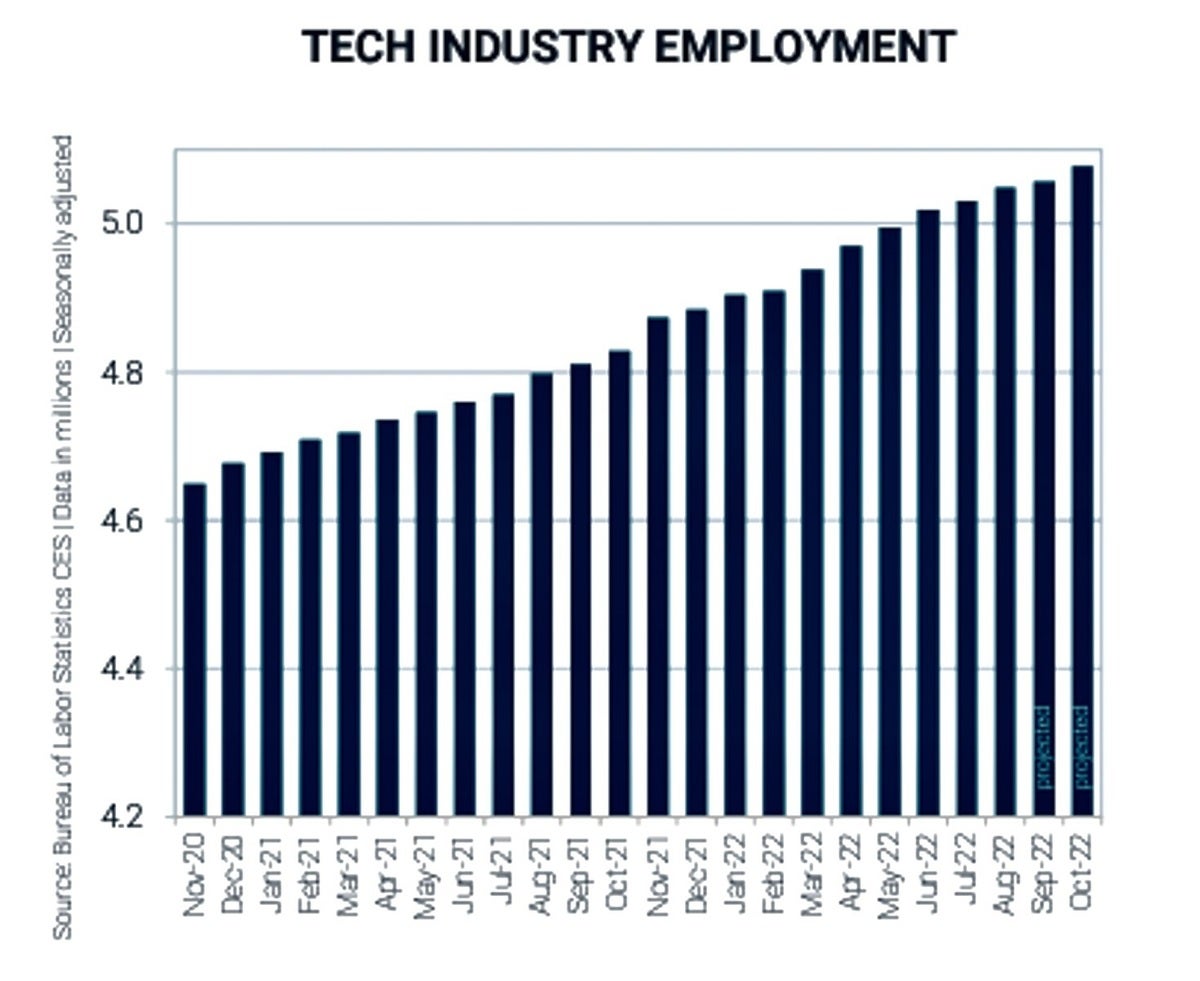
While the tech industry unemployment rate ticked up slightly to 2.2% in October from 2.1% in September, it remained well below the overall US unemployment rate, according to CompTIA’s report. The overall US unemployment rate also ticked up to 3.7% in October.
CompTIA’s jobs report differs somewhat from Janco Associates's figures. Janco reported 15,300 new hires by tech companies in October; that compares to 13,700 job listings added by the tech industry the previous month.
There are now a total of 3.98 million jobs for IT professionals in the US, according to the BLS data analyzed by Janco.
“Based on our analysis, the IT job market and opportunities for IT professionals will continue to be positive, but not as broad in scope as in the first three quarters of 2022,” Janulaitis said in a statement. “CIOs and CFOs are looking to improve the productivity of IT. That means they are focusing on eliminating “non-essential” managers and staff. They will continue to hire coders and developers.”
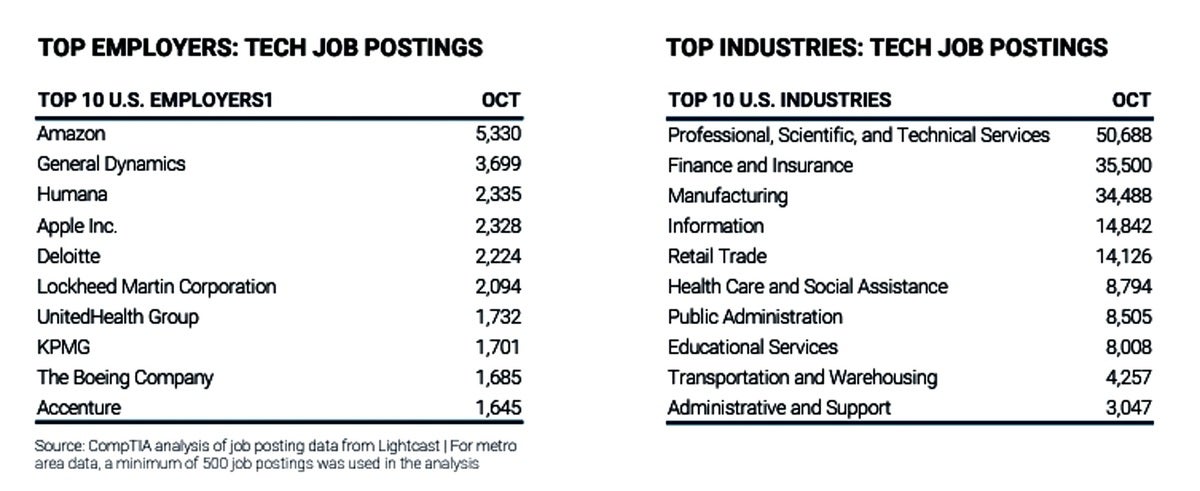
The highest demand in IT will be for programmers, blockchain processing, and security professionals, according to Janulaitis. Much of the hiring will be limited to filling positions that have been approved and are unfilled — not staff expansion.
Within the tech industry, the bulk of new hiring occurred in three sector categories, according to CompTIA:
- IT services and custom software development (+8,800)
- Other information services, including search engines (+6,800)
- Computer and electronic products manufacturing (+5,400)
In Janco’s mid-year 2022 IT Salary Survey, it found IT salaries for existing IT staff and middle managers increased by just under 3%, while new hires were paid 5% to 6% more than existing staff. “In conversation with several CIOs, we observed that starting pay rates for new hires were in the 8%-10% range a few months back, but this is not the case currently,” Janulaitis said.
The disparity in pay between veteran IT workers and new hires is a point of contention and has likely led to some problems in worker motivation, according to Sinem Buber, lead economist with ZipRecruiter. When new employees are hired, they often come in with pay and benefits equal to or better than veteran employees. Even as companies have raised wages, it’s often across the board, ignoring seniority.
“So, the link between hard work and raises is broken,” Buber said.
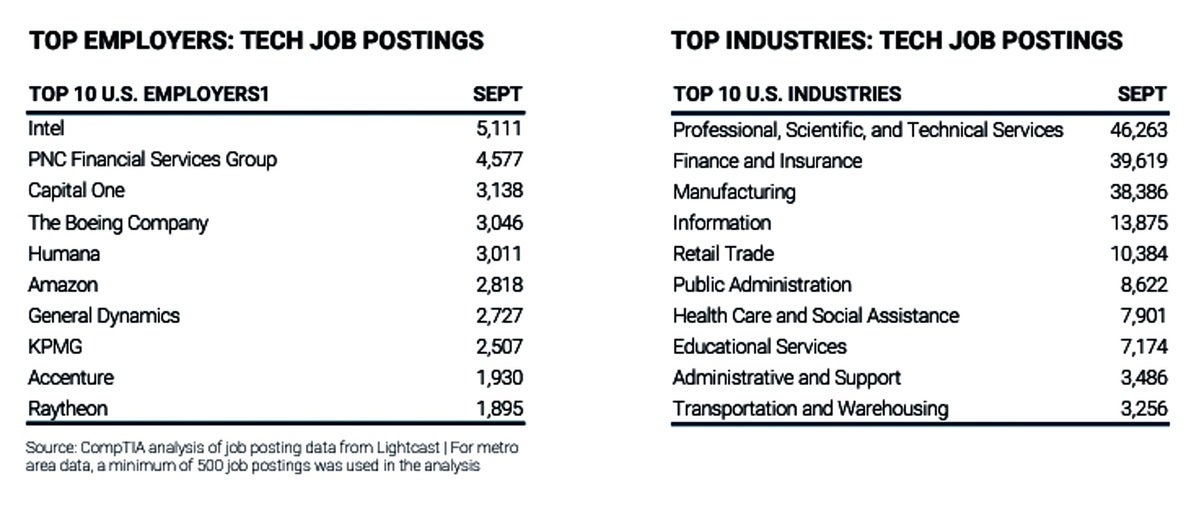
Remote work hiring trends on the upswing
Remote work shows no signs of slowing down, according to CompTIA. Employer job postings for tech positions that specify remote work or work-from-home options continue to increase, with a year-to-date rate of 34% compared to 27% in 2021, and 22% in 2020.
Major tech hubs saw significant month-over-month increases in tech jobs postings, including Boston (+2,732), New York City (+1,459), San Francisco (+884) and San Jose (+864). The top industries for tech job postings were professional, scientific, and technical services (50,688); finance and insurance (35,500); and manufacturing (34,488), according to CompTIA.
Positions for software developers and engineers led the October job postings (85,796). “There is also strong demand for IT support specialists, IT project managers, systems engineers and network engineers,” CompTIA said.
September 2022: Janco analysis
IT job growth has continued each month for over a year, and in the last 12 months 202,800 jobs have been added, according to the latest US Bureau of Labor data, which was analyzed by IT consultancy Janco Associates.
At the same time, CIOs and CFOs have started to slow the rate at which they’re creating new IT jobs and hiring due to inflation and recession fears, according to Janco’s latest report.
“Based on our analysis, the IT job market and opportunities for IT professionals will continue to be positive, but not as broad in scope as in the first nine months of 2022,” said M. Victor Janulaitis, CEO of Janco Associates. “CIOs are still posturing to hire staff and expand technologies to address blockchain processing and security applications based on market conditions. However, most hiring will be limited to filling positions open due to attrition, not staff expansion.”
U.S. tech firms added workers for the 22nd consecutive month, and companies across the economy hired an estimated 84,000 new tech workers in September, according to the latest Tech Jobs Report from CompTIA.
Job postings for new hiring were down 12% from August, but still totaled just over 300,000. Positions in software development and engineering, tech support, tech project management, systems engineering, and network engineering were in highest demand, according to CompTIA.
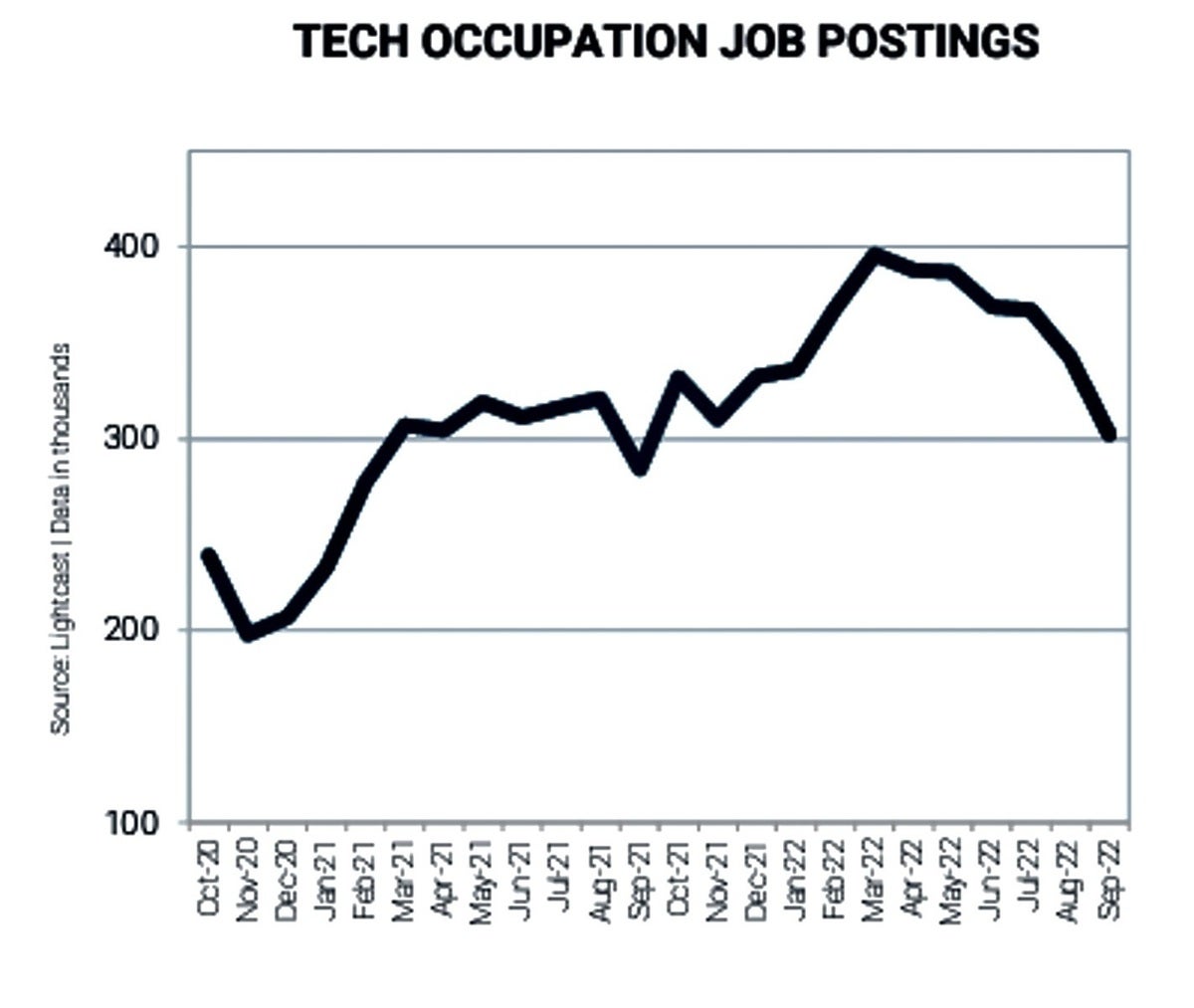
About 30% of all postings were for positions in emerging technologies or in jobs that require emerging tech skills. Positions that offer remote work or work from home as an option surpassed 109,000.
Another new report by UK-based job search engine Hired showed that, unlike 2021, when companies were hiring faster than in years prior, the overall time to hire job seekers in 2022 slowed across the US, UK, and Canada. UK companies are now taking 68 days on average to fill open positions. US companies aren’t moving much faster, taking 60 days (up from 52 days in 2021). In Canada, it’s now 54 days. (Remote roles took 40 days to fill – that's slower than in 2021, but the shortest time to hire overall, Hired said.
“Why? It’s not clear yet," Hired said in its report. "Are jobseekers taking longer to evaluate opportunities? Or are employers moving candidates through the funnel more carefully? While this indicates an increase in the time to fill roles, it doesn’t equal an overall slowdown in tech hiring."
Data from Hired indicates employers offering remote roles have a hiring edge over those requiring hybrid or on-site jobs. Since June 2021, candidates showed a preference for remote-only roles.
In January, 18% of active jobseekers indicated they only wanted remote roles. By May, preference for "only remote" roles climbed to 31% of all active jobseekers on Hired's platform, and rose another percentage point to 32% in June. By June, 93% of candidates showed a preference for remote or hybrid jobs.
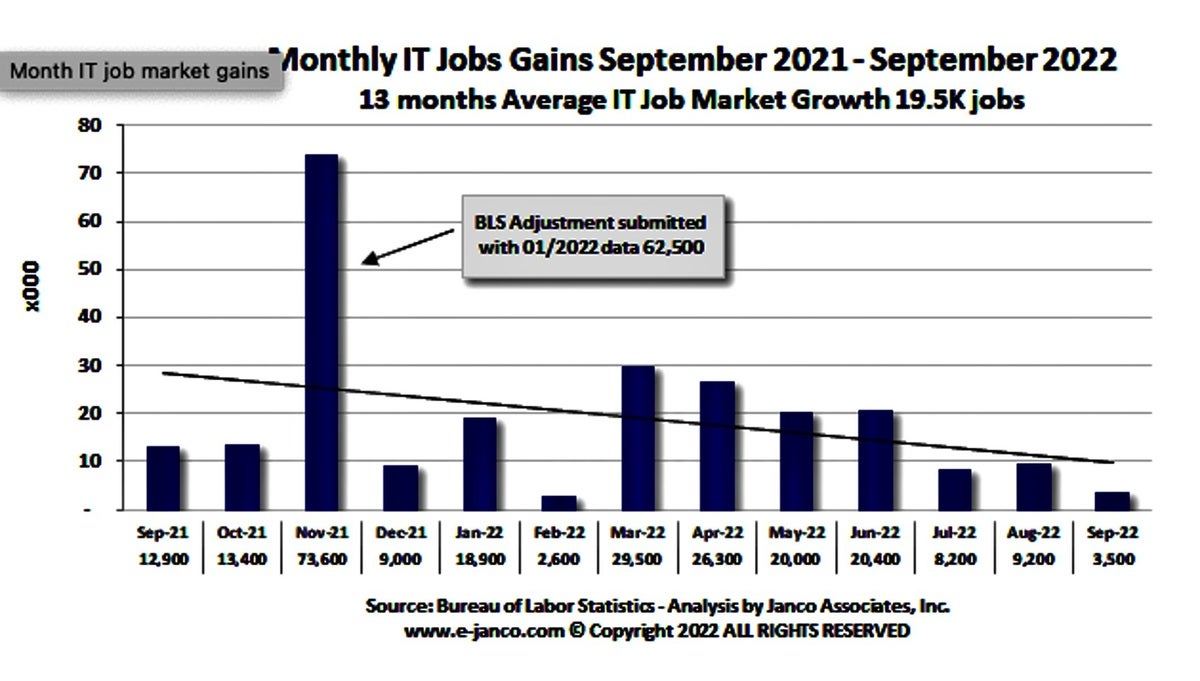
Throughout the year, IT salaries in the US and Canada (except for junior candidates with less than two years of experience) saw significant growth.
Mid-level US candidates with four to six years of experience saw the biggest jump from $146,000 to $154,000 between 2021 and 2022. Remote salaries for all candidates, except the most junior, also saw significant growth; on average they jumped by $7,000 to $8,000 from 2021 to 2022.

September 2022: CompTIA analysis
Tech companies added 25,500 workers last month, one of the strongest hiring months so far this year, according to new data from the US Bureau of Labor Statistics (BLS) and industry analysts.
So far this year, employment in the tech industry has increased by 175,700 jobs, 46% ahead of 2021 — and 92% ahead of 2019, according to CompTIA, a nonprofit association for the IT industry and workforce. (The total includes all employees —technical and non-technical — on the payrolls of tech companies.)
“Stability in tech hiring continues to be an over-arching theme this year,” said Tim Herbert, chief research officer at CompTIA. “Despite all the economic noise and pockets of layoffs, aggregate tech hiring remains consistently positive.”
According to the latest BLS data, analyzed by IT consultancy Janco Associates, there are now 3.97 million jobs for IT Professionals in the US. For 24 months in a row, there has been an increase in the number of jobs added to the IT job market. Janco sees this trend continuing, according to its latest report released Friday.
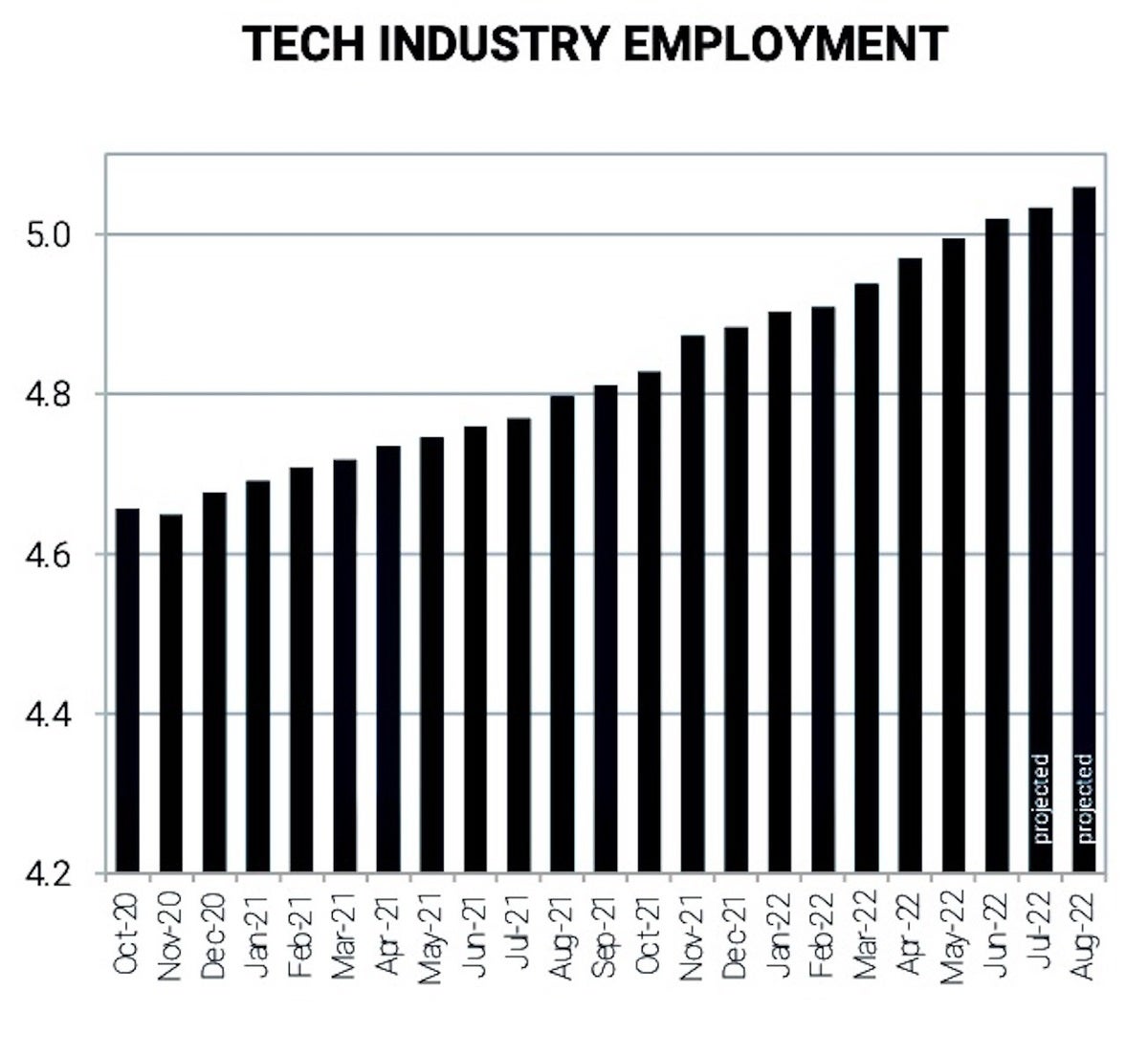
The unemployment rate for tech occupations rose to 2.3% in August from 1.7% in July, according to CompTIA. There are likely two reasons for it jump: the overall US unemployment rate increased, as well, and some large tech firms announced layoffs, Herbert noted.
“The other component is we’ve seen a rebound in consumer confidence and worker confidence,” Herbert said. “So, it can also be attributed to tech workers feeling a renewed sense of confidence, and so they’ve quit their job and they’re looking for new opportunities. That was far more prominent earlier this year and last year with the 'Great Resignation.'”
The number of workers quitting their jobs remained above 4 million in August, according to BLS data. Since June 2021, more than 4 million people have quit every month, according to BLS data, giving rise to the trend known as the Great Resignation. The trend reflects a deep dissatisfaction by many workers with their employment situations. The ongoing global pandemic pushed workers to rethink their careers, work/life balance, long-term goals, and working conditions.
Overall employer job postings for tech positions eased in August to just under 320,000 from 372,000 in July, with 31% of jobs posted last month for positions in emerging technologies, such as artificial intelligence, machine learning and IoT, or in roles that require emerging tech skills, such as data analytics and automation software.
“A lot of the technology is mature enough now that a lot of positions are implementing automation solutions, robotic process automation,” Herbert said. “Next-generation roles include cybersecurity, and broad categories of automation, so, marketing automation and HR automation.”
From January through August 2022, tech job postings where employers specify remote work or work from home as an option were up 56% over last year —and up 281% from the pre-pandemic year of 2019, according to CompTIA.
“The one thing that jumped out at me, to no surprise, was the trend toward remote work that I think is now in a semi-permanent state,” Herbert said.
The increase in remote employment was highlighted by the leap in tech job postings in states such as Wyoming, Montana and Alaska, Herbert said.
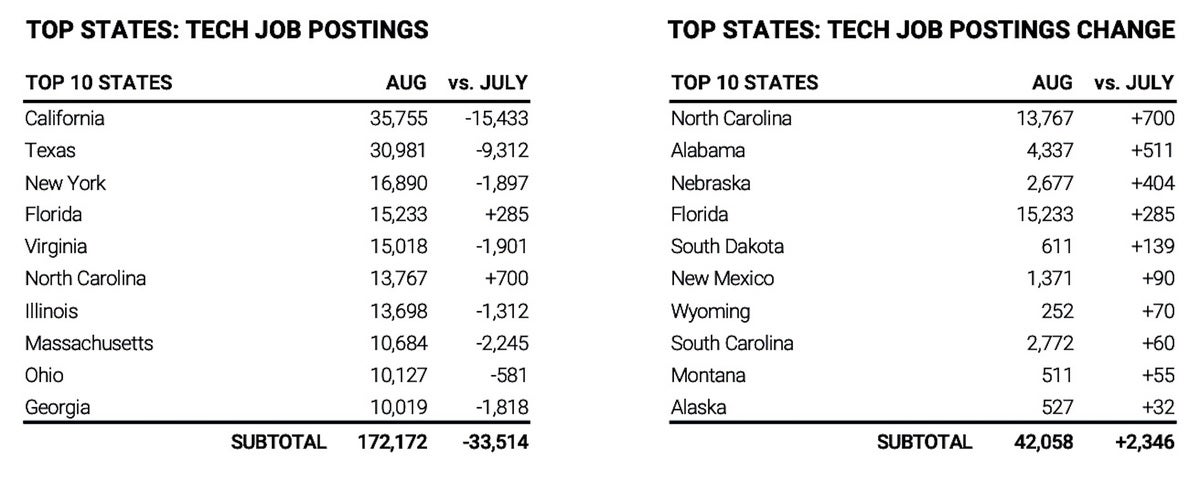
Even as hiring was up, the number of job openings dropped, indicating the pace of new job vacancies could be slowing, according to Janco Associates. Its data is based on the latest BLS statistics.
There is some slowing in hiring as fears of a significant downturn or recession are on the horizon, Janco's report stated.
“CIOs and CFOs now are more cautious than they were in the first quarter. CIOs do not have a clear understanding of how a downturn will impact their bottom line. Most still are hiring but at a slower pace,"Janco CEO M. Victor Janulaitis wrote in the report. "Some companies have stopped hiring and started laying off employees."
"With all that, the IT job market remains tight with an average of 200,000 IT professionals jobs that are not filled due to a lack of qualified candidates," Janulaitis continued. "The number of unfilled IT jobs has peaked from over 260,000 in April to 210,000 in July. That should still be enough of a buffer to keep hiring of IT pros on a positive track.”
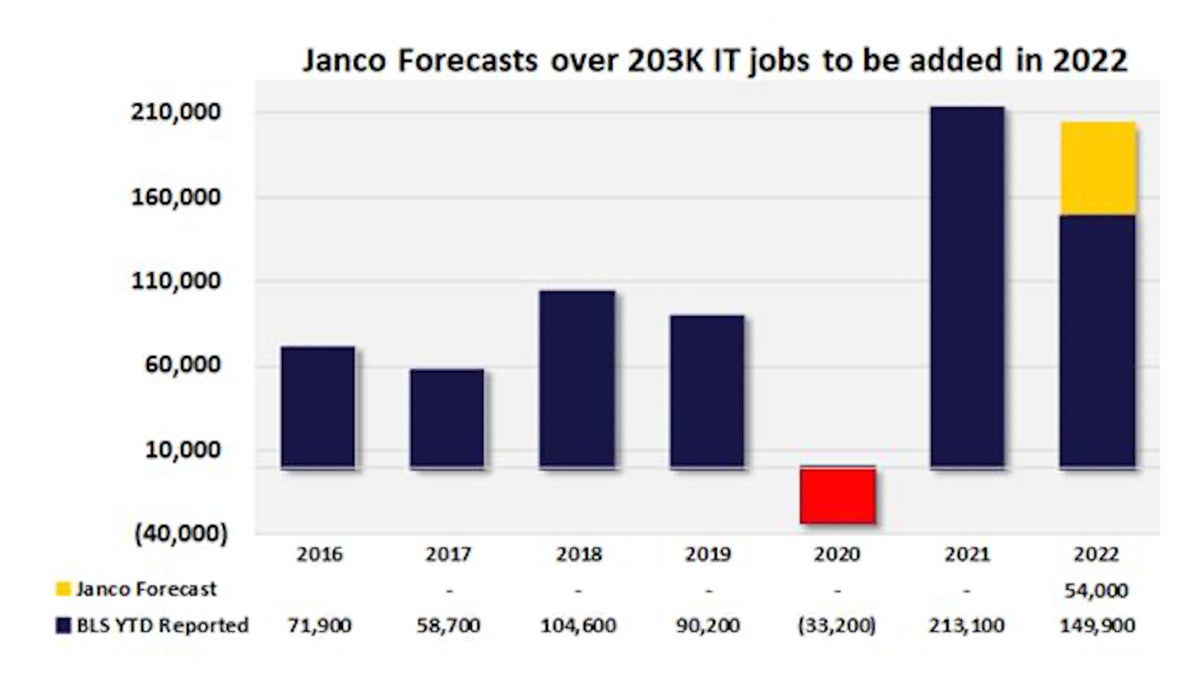
Janulaitis also said new IT hires are on average receiving salaries that are 5% to 6% above pay for existing positions -- and in some cases as much as 10% higher; The higher starting pay is needed to attract the best IT candidates. That salary disparity, however, is driving dissatisfaction and an increase in attrition rate among existing employees, according to Janulaitis.
"The challenge CIOs face will be how to keep the balance between the existing budget, providing salary increases to existing employees that address inflation and higher commuting costs, and having sufficient resources available to achieve the enterprise’s technology and bottom line objectives," Janulaitis said.
The BLS doesn't track tech industry jobs directly. Instead, the agency uses the "information sector" as a proxy for tech employment because there are tech jobs in most industries, and therefore technology is not an industry in and of itself.
The nation’s unemployment rate rose from 3.5% to 3.7% in August, with the number of unemployed rising by 344,000 to 6 million.
Overall, the US economy added 315,000 jobs in August, which was more than economists had predicted, but still far less than the 526,000 positions added in July – a record month for jobs.
Professional and business services added 68,000 jobs in August, according to the BLS. Within the industry, computer systems design and related services added 14,000 positions; management and technical consulting services grew by 13,000; and scientific research and development services increased by 6,000. Over the past 12 months, professional and business services has added 1.1 million jobs, according to the BLS.
“CIOs and CFOs now are more cautious than they were in the first quarter. CIOs do not have a clear understanding of how a downturn will impact their bottom line,” Victor Janulaitis, CEO of Janco Associates said in a report last week. “Most still are hiring, but at a slower pace. Some companies have stopped hiring and started laying off employees.”
With all that, the IT job market remains tight, with an average of 200,000 IT professional jobs that are not filled due to a lack of qualified candidates, according to Janulaitis. If there is a major recession, many companies will choose not to fill those new open positions.
“That should be enough of a buffer to keep the hiring of IT pros on a positive track,” he said.
August 2022
Despite a number of sizeable layoffs at high-profile companies in recent months, the tech sector continued to lead all others in low unemployment rates in July, according to a new report from CompTIA, a nonprofit association for the IT industry and workforce.
Tech occupations across all industry sectors increased by an estimated 239,000 positions last month, according to an analysis of US Bureau of Labor Statistics (BLS) data by CompTIA.
Tech industry employment saw a net gain of 12,700 workers, the 20th consecutive month of growth. So far this year, the tech sector has gained 143,700 jobs, an increase of 55% year-over-year, according to CompTIA. The unemployment rate for tech jobs was just 1.7% in July (1.3% for women, 1.8% for men), roughly half the overall US unemployment rate of 3.5%.
Employer job postings for tech positions approached 484,000 in July, a slight decrease from the previous month but still at a near record level. Through the first seven months of 2022, US companies listed approximately 3.1 million jobs postings for tech positions, up 49% compared to 2021.
“The tech jobs market has repeatedly outperformed in the face of real and perceived economic weakness,” Tim Herbert, chief research officer at CompTIA, said in a statement. “The data confirms that for every layoff announcement there are other employers stepping in to take advantage of tech talent hiring opportunities.”

Meanwhile, since June 2021, more than 4 million people have quit their jobs every month, according to BLS data, part of a trend known as the Great Resignation. The trend reflects a deep dissatisfaction by many workers with their employment situations. The ongoing global pandemic has enabled workers to rethink their careers, work/life balance, long-term goals, and working conditions.
Some of the top reasons workers quit this year are unhappiness with how their employer treated them during the pandemic (19%), low pay or lack of benefits (17%), and a lack of work-life balance (13%), according to a survey by employment listing website Joblist.
The BLS doesn't track tech industry jobs directly. Instead, the agency uses the "information sector" as a proxy for tech employment because there are tech jobs in most industries, and therefore technology is not an industry in of itself.
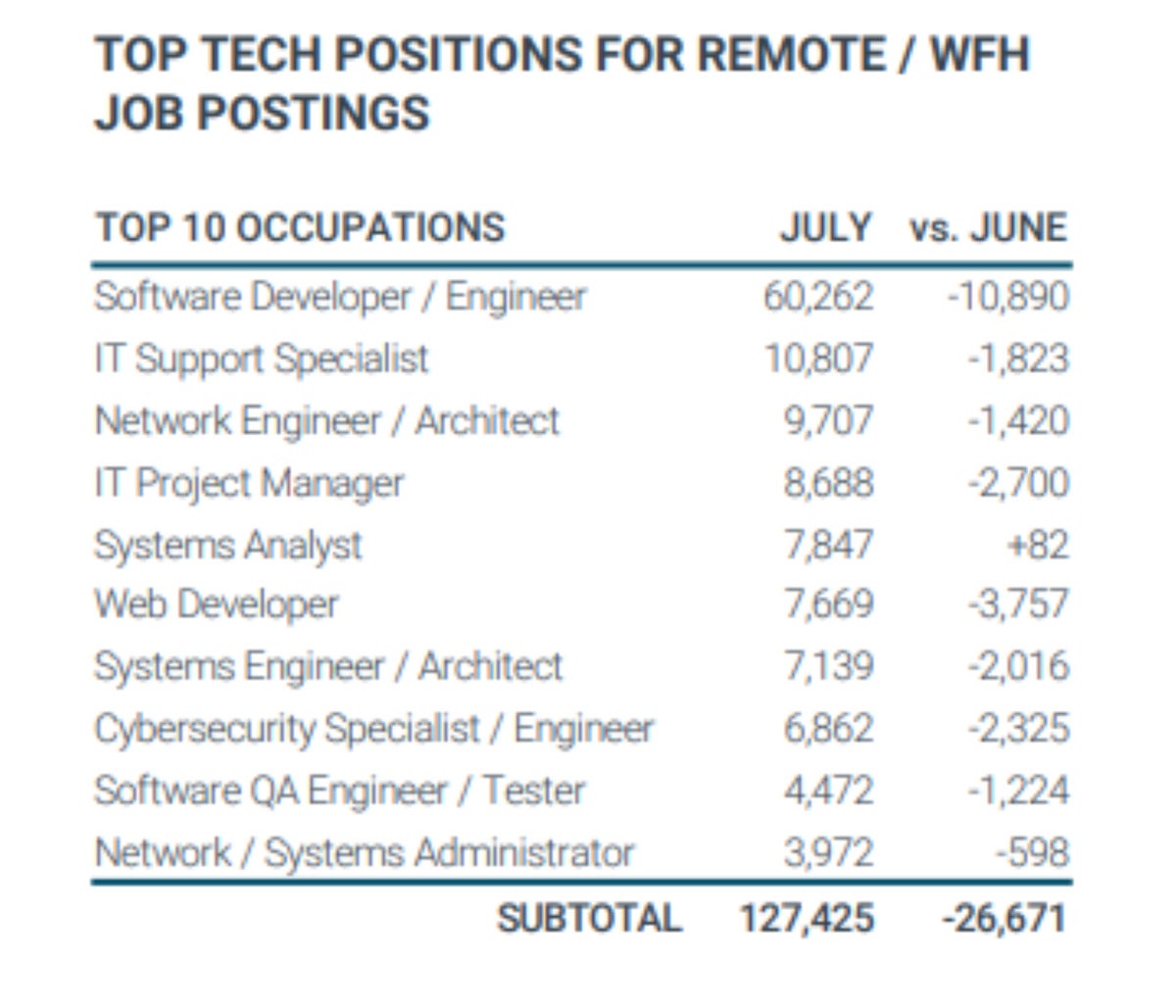
Within the tech sector, three occupation categories recorded job growth in July – other information services, including search engines (+6,800); data processing, hosting and related services (+4,100); and computer and electronic products manufacturing (+3,300). Hiring in the IT services and custom software development category was flat, while telecom-related occupations declined (-1,400), according to CompTIA.
About one in five tech job postings in July were for positions requiring two years or less of experience. About half specified three to five years of experience, while 13% sought candidates with nine or more years of experience, CompTIA said.
Many employers, even those in tech industries, are ending college degree requirements for many job openings. Instead, organizations are focusing on the skills, experience, and personality traits of job candidates. The sea change opens up tech jobs to a more diverse pool of candidates.
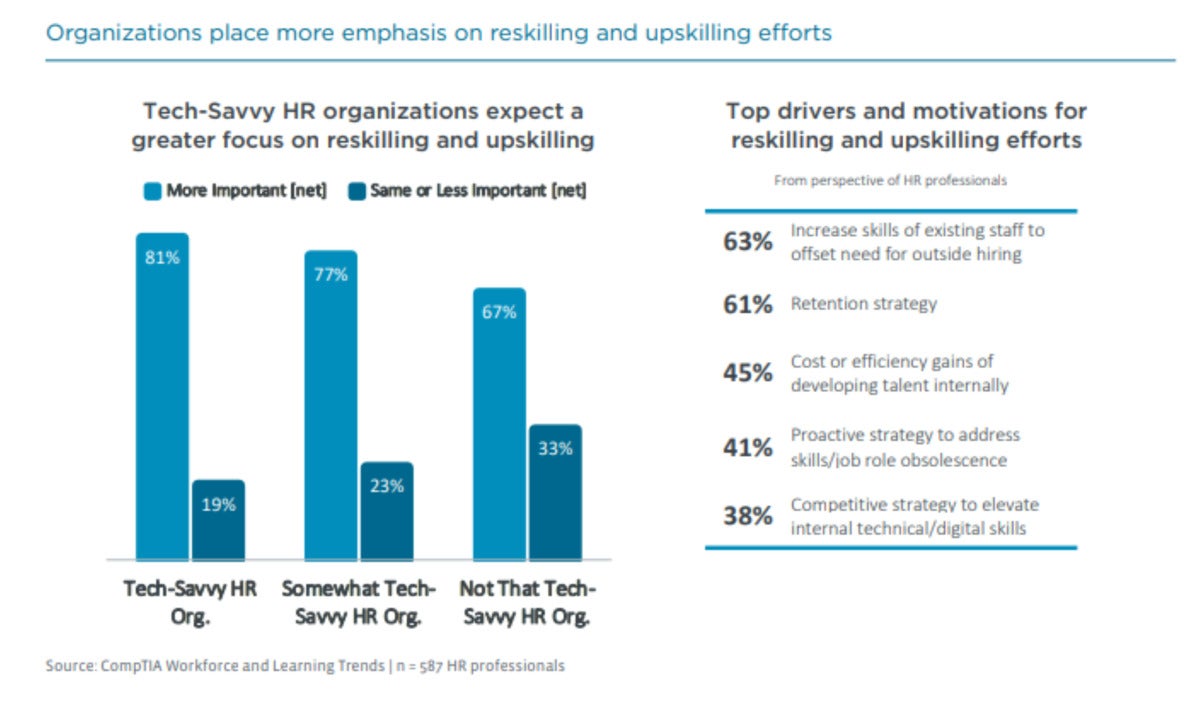
Software developers and engineers are the most in-demand positions employers are looking to fill — accounting for nearly 148,000 job postings last month. There is also a strong job market for IT support specialists, IT project managers, systems engineers and architects, and network engineers and architects. Positions in emerging technologies or jobs requiring emerging tech skills accounted for one-third of all postings in July.
Faced with a dearth of workforce talent, many tech companies and others are hiring through non-traditional approaches that include coding bootcamps, low-code training, and a focus on population areas outside the norm.
July 2022
Over the past three months, IT job openings for entry-level positions have declined significantly, according to a new report.
Job openings for entry-level tech workers declined from 29,500 in April to 24,000 in May and to 18,400 in June, according to IT employment consultancy Janco Associates.
Janco’s report, which was compiled from US Bureau of Labor Statistics (BLS) and survey data, said the downward trend is the result of several factors — the most critical of which is an increasing belief among C-level executives that we are already or soon will be in a recession.
In creating its May forecast for future IT hiring, Janco found that almost all 217 CIOs it surveyed are planning on:
- Limiting the extension of existing contracts for contract workers and consultants beyond the 3rd quarter of the year.
- Managing the full-time employee headcount to budgeted levels through the end of this year.
- Not replacing departing employees who do not have critical IT skills and/or enterprise-specific operational knowledge.
“In our interviews, we have found that Wall Street has stopped hiring, and a number of job offers for recent IT college graduates have had offers that were extended pulled back,” Janco’s report stated. “The initial indicators from the monthly BLS data for June seem to be reinforcing those findings.”
Janco’s report noted that some organizations have already started the process of layoffs.
- Netflix, PayPal, Getir, Klarna, Bolt, and Carvana instituted layoffs in May.
- Coinbase will cut 1,100 jobs, about 18% of its global workforce.
- Microsoft is slowing down its hiring “to better align its resources.”
- Meta (Facebook) and Twitter have frozen hiring for some departments.
Gartner research shows that just 4% of US companies have started laying off employees, while 7% have frozen hiring and 15% have started to slow down hiring.
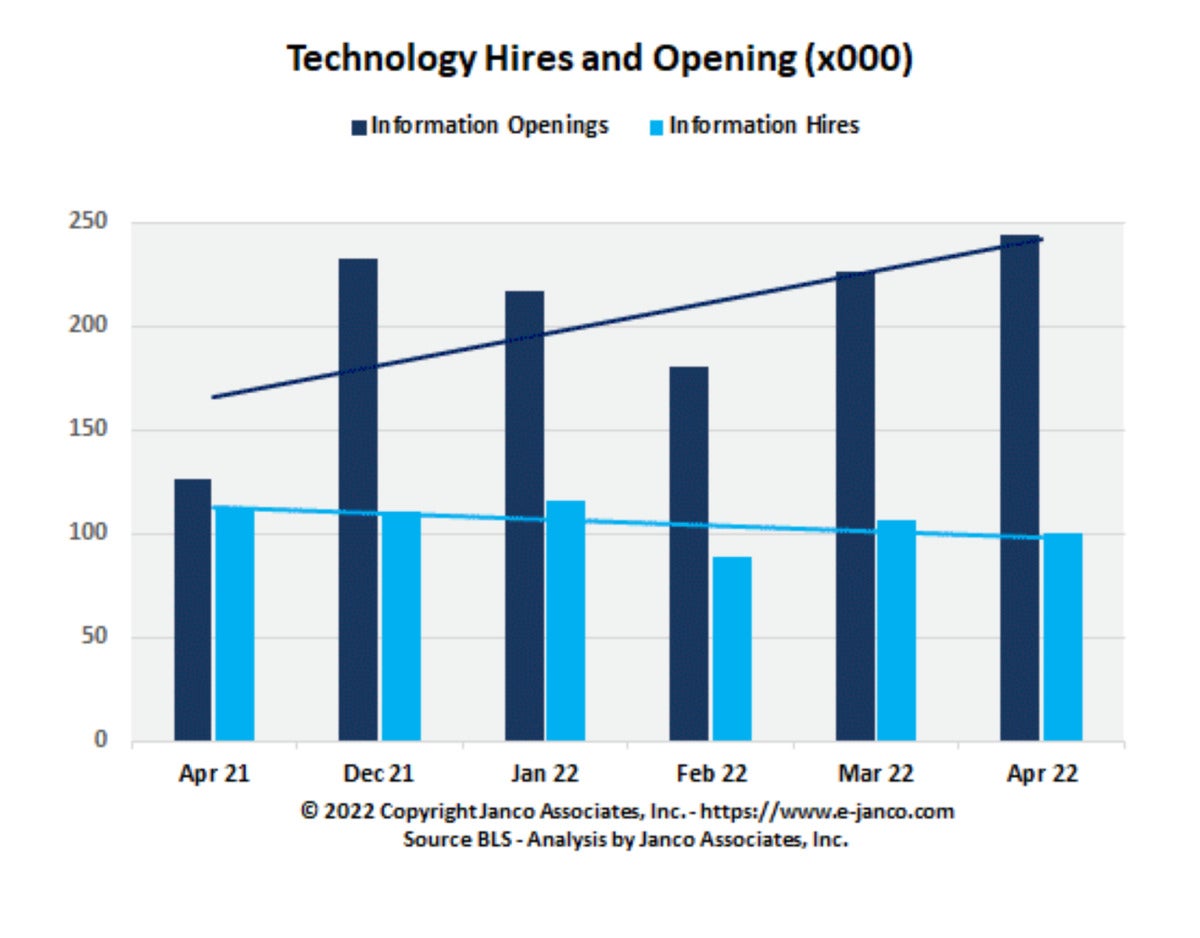
Hiring is still robust for experienced IT pros —particularly for certain job titles, including security-related positions and in-demand technology, such as blockchain and e-commerce positions — but entry-level candidates are finding it more difficult to find new jobs, according to Janco.
Overall, the number of open jobs in the US at the end of May was 11.3 million, a drop from 11.7 million in April, according to the BLS's May Job Openings and Labor Turnover Survey (JOLTS) report. Despite the drop in open requisitions, the U.S. added 390,000 jobs in May; The unemployment rate also held at 3.6%, and there were almost two job openings for each unemployed American. The number and rate of workers quitting their jobs remained almost unchanged at 4.3 million and 2.8%, respectively.
The impact of inflation and the potential of a significant downturn is not reflected in the preliminary budgets for 2023. Most CIOs and CFOs are trying to determine what they will do if that downturn occurs, Janco reported.
Janco also publishes a biannual salary survey in January and July. The just-published survey results showed that IT salaries were on the rise in the first six months of 2022. For the first time, median salaries for all IT pros in large enterprises exceeded $100,000.
Midsized companies were offering the greatest salary increases, which averaged north of 4% for IT middle managers and staff. IT executives saw an average 3.04% salary increase this year.
Large enterprises were more miserly, with staff receiving a 3.27% average increase and executives and middle managers earning a 3.47% and 1.20% average boost, respectively.
The unemployment rate for tech occupations fell to a near-record low in May, and employer job postings for tech positions passed 443,000, according to an analysis of the latest labor market data by CompTIA, a nonprofit association for the IT industry and workforce.
“The already tight labor market just became even tighter as competition for tech talent reaches near-record levels,” said Tim Herbert, chief research officer at CompTIA. “For any employer relying on the old hiring playbook, it’s time to rethink approaches to recruiting and retention.”
Employers throughout the US economy are stepping up their search for tech workers and tech companies continue to expand payrolls, according CompTIA. Specifically, tech firms added 75,200 workers through the first four months of 2022.
More than 190,000 new IT jobs will be created in 2022, according to IT employment consultancy Janco Associates. The IT job market now has more than 3.85 million positions in the US, with about 130,000 of those positions unfilled, Janco’s report stated.
Some of the top tech jobs in terms of hiring and pay include software developer/engineer, IT project manager, IT support specialist, systems engineer/architect, and network engineer/architect, according to CompTIA’s jobs report.
Tech workers employed in the cloud space saw some of the greatest salary increases over the past year, according to a new salary survey from O’Reilly Media, an online IT training provider. According to the report, cloud-focused workers are the most sought-after tech talent as a growing number of organizations of all sizes utilize cloud tools and services.
The survey revealed that cloud professionals are paid an average yearly salary of $182,000. Report findings also show the impact of the great reshuffle within the tech sector, with 20% reporting they’ve already changed employers over the last year, and 25% of respondents planning to find new employment with better compensation, raising a question of whether the great reshuffle will continue.
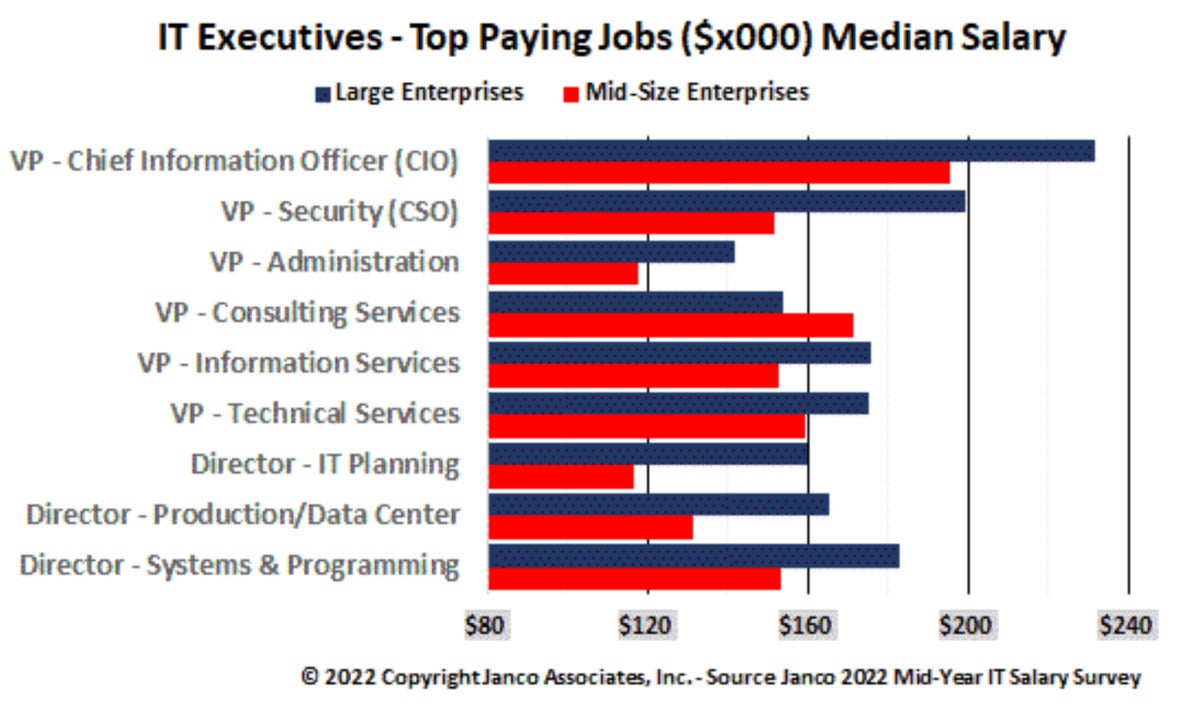
The average salary increase over the past year for cloud workers was 4.3%. The average salary for women, unfortunately, is 7% lower than the average salary for men, the survey also found.
The highest-paid job titles include directors ($235,000) and executives ($231,000), followed by architects, “leads,” and managers ($196,000, $190,000, and $188,000, respectively).
“During the pandemic, we witnessed millions of workers resign from companies in an effort to reconfigure their careers and take deliberate steps toward new job opportunities with higher wages and better alignment between their work and life goals,” said O’Reilly President Laura Baldwin. “With these workers in such demand, we anticipate the great tech exodus to continue unless employers step up with competitive pay, substantial benefits, remote work flexibility, and on-the-job learning and development.”



Recommended Comments
There are no comments to display.
Join the conversation
You can post now and register later. If you have an account, sign in now to post with your account.
Note: Your post will require moderator approval before it will be visible.